|
Darusman Report:
Humanity extended by Security Forces ignored
By Ranil WIJAYAPALA
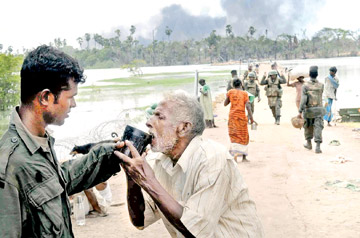
Giving water to an elderly person |
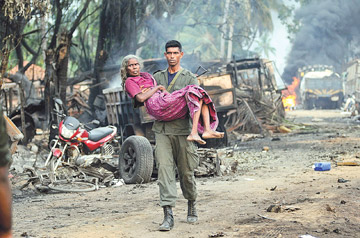
An old womqn being carried by a security forces personnel |
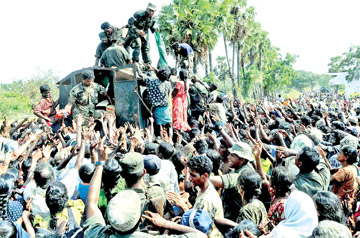
Soldiers assisting the Tamil civilians who fled from the
clutches of the LTTE |
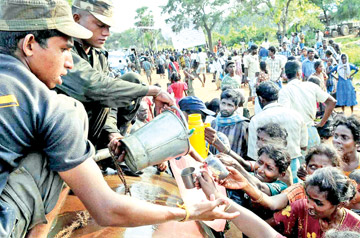
Soldiers providing water to the last batch of civilians arriving
through Vadduvakkal bridge Pix: Rukmal Gamage |
It was with heavy heart, that I went through the pages of the report
released by the Advisory panel to the UN Secretary General Ban ki-Moon
on the final days of the humanitarian operation conducted by the Sri
Lankan Security Forces against the Liberation Tigers of Tamil Eelam,
which was among the most ruthless terror outfit in the world.
Going through the report I felt , for whatever reasons, the panel
headed by Maruzuki Darusman attempted to make the Security Forces, who
had liberated more than quarter million Tamil population from the ‘hell’
they were living at the final stages of the humanitarian operation under
the iron grip of the LTTE, the villains of the whole episode.
The panel has presented their report in a narration and point form,
very silently building up an argument that the humanitarian operation
conducted by the Sri Lankan Security Forces to rescue the Tamil
population was conducted totally against internationally accepted norms
and conventions to which Sri Lanka is a signatory.
For me, that was the essence of the whole report exceeding 200 pages
along with annexes, that was presented by the advisory pannel to the UN
Secretary General and also to the entire world exceeding its mandate as
very correctly pointed out by the Sri Lankan Government and experts on
international affairs.
Arguments
Apparently, they have built their arguments based on the facts either
forwarded to them by individuals and organisations representing the
Tamil Diaspora and also by the UN and other INGOs including the ICRC
representatives who were there in the LTTE controlled areas and within
the Government declared No Fire Zones at the final stages of the war.
I felt the report is biased, because the panel has presented it with
images which could rouse the sentiments of anyone, who has very little
knowledge about the ground realities in the Northern battle front at the
final stages of the humanitarian operation, against the Security Forces.
If not for my frequent visits to the battle front, throughout the
entire humanitarian operation from Mavil Aru to Vellamullivaikkal, I
would have also been a blind follower of the Darusman Report as it is
effective enough to paint a picture of the Sri Lankan Security Forces as
a set of inhumane butchers executing innocent civilians in the name of
liberating them.
So, as a journalist who was there in the operational area when the
Security Forces were rescuing the civilian population, I was in an
advantageous position to visualise the correct situation there and see
the humane way the Security Forces treated civilians who had been
rescued by them from the clutches of the LTTE.
Therefore, it is disheartening to observe that the panel of experts
have not come across any image of the Sri Lankan Security Forces who had
relentlessly fought against the LTTE to liberate not only the area but
also the civilian population from the clutches of the LTTE.
Instead, the report was harping on the fact that the ‘no fire zones’
frequently came under heavy artillery fire of the Security Forces.
So, the panel of experts, have to clarify whether the Security Forces
had committed an unforgivable sin by liberating the civilian population
from the immense suffering for decades at the hands of the LTTE.
If the panel of experts are aware, how much trouble the Security
Forces had taken in the planning process of the Puthumattalan human
rescue operation from the second No Fire Zone declared by the
Government, they will be ashamed of their own report!
It is learnt that the Government and the Security Forces are going to
respond to the report in a comprehensive manner to enlighten the entire
international community about the true picture of what the Security
Forces had to come up with in the last stages of the humanitarian
operation.
It will definitely add light on the panel of experts about the exact
situation that prevailed in the combat zone in the final stages of the
humanitarian operation as the Security Forces had to operate extremely
difficult situation.
The Security Forces committed themselves not to harm a single
civilian when rescuing civilians from ‘hell on the earth’ and briefed
even the lowest ranking infantrymen who were supposed to reinforce the
troops engage in the operation on April 19, 2009 midnight, not to harm a
single civilian when conducting their operation.
If the Security Forces commanders just gave them orders to break the
walls of the No Fire Zone and get rid of the LTTE, they could have
easily accomplished their task, but there would have been heavy civilian
casualties and deaths.
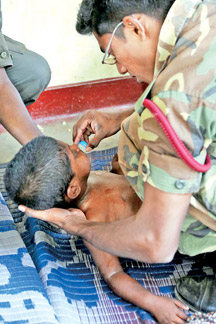
Treating sick children |
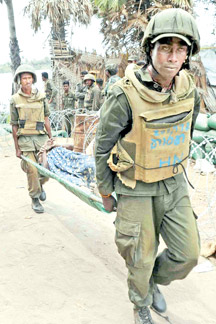
Bringing sick civilians in stretches |
| |
If they did so, they would not have lost the lives of 18 elite
commandos and get 60 odd commandos wounded in the operation.
Army officers who actively engaged in the operation refused to have a
fire plan even in the case of an emergency situation, when conducting
the biggest ever hostage rescue mission in the world.
“I did not want such plans as we were confident that we could achieve
our target without a fire plan and we achieved that,” the officer added.
The Security Forces went beyond their limitations when extending
their hand to the pathetic crowd who were eagerly awaiting the arrival
of the Security Forces to rescue them from the LTTE.
They made available the route meant for casualty evacuation for
civilians to arrive into the Government controlled areas.
Bottle of water
“When I gave my bottle of water to one mother she just wet the lips
of her child as there were many more children waiting for a drop of
water. So we gave everything we had in our possession to quench their
thirst,” an Army officer involved in the Puthumattalan human rescue
mission while sharing his experience with me said.
“Sometimes our soldiers have seen Tiger cadres leaving their guns and
joining civilians but they never became aggressive towards them as they
were aware that an overwhelming majority of civilians willingly or
unwillingly supported the LTTE when they were living under their
control,” the officer added.
The Security Forces were aggressive with the enemy but not at all
with civilians. They have quite clearly displayed their human qualities
right throughout the humanitarian operation and did not act like
barbarians ignoring civilian casualties.
If the panel of experts emphasise the fact that the Security Forces
have committed crimes against humanity, why should the Security Forces
welcome all those civilians with open arms when LTTE cadres were
directing fire at them when they were fleeing from LTTE areas to reach
government controlled areas.
According to Section 112 of the report ; As the situation in the
second NFZ worsened, large numbers of civilians tried to escape
LTTE-controlled areas, but the LTTE sought to prevent this with
increasing brutality. Some LTTE cadres would let fleeing civilians
through, but others opened fire on them with AK47s, killing men, women
and children, alike. The IDPs, who attempted escape, desperately tried
to run away and to reach SLA lines, carrying their children or luggage
or dropping them in their panic.
Some were killed on the spot; others flailed in the shallow water or
incurred terrible injuries by stepping on landmines. Small children and
others drowned in the lagoon.
While it is not known precisely how many people died this way, the
number was significant and rose as the armed conflict progressed.
The expert pannel fail to mention that it was the Security Forces who
welcomed those civilians to the cleared areas, risking their lives to
rescue those civilians.
Section 51 of the report said: As LTTE recruitment increased, parents
actively resisted, and families took increasingly desperate measures to
protect their children from recruitment. They hid their children in
secret locations or forced them into early arranged marriages.
Meanwhile Section 52 says that LTTE cadres would beat relatives or
parents, sometimes severely, if they tried to resist recruitment. All
these approaches, many of them aimed at defending the LTTE and its
leadership, portrayed callousness to the desperate plight of civilians
and willingness to sacrifice their lives.
Section 53 of the report states :Beginning in February, the LTTE
commenced a policy of shooting civilians who attempted to escape, and,
to this end, cadre took up positions where they could spot civilians who
might try to break out.
Dealing with the same subject Section 98 and 99 also mention that,
“In spite of the futility of their military situation, the LTTE not only
refused to surrender, but also continued to prevent civilians from
leaving the area, ensuring their continued presence as a human buffer.
It forced civilians to help build military installations and
fortifications or undertake other forced labour.
It also intensified its practice of forced recruitment, including of
children, to swell their dwindling ranks.
99 Nonetheless, as the situation in the second NFZ worsened, growing
numbers of civilians sought to escape LTTE-controlled areas.
Civilians waded long distances through the lagoons or across
mine-ridden territory, often in the dead of night. Inevitably people
stepped on landmines and lost their limbs or were fatally injured.
Whilst explaining the brutalities of the LTTE, the panel of expert
fail to mention that they were the reason for the Security Forces to
conduct such a mind boggling humanitarian operation to rescue civilians
from the LTTE.
In the absence of well reputed international INGOs in aid of the
exodus of civilians it was the Security Forces who fed more than 130,000
civilians flooded from the No Fire Zone in Puthumattalan for more than
three days. The Sri Lanka Army had a mechanism to provide fresh meals
for such a large number of people at once till they registered each and
every civilian before they were sent to welfare centres in Vavuniya.
It is true that civilians had to be thoroughly screened before they
reached the cleared areas. Sometimes they had to pose naked in
underground bunkers in the screening process. The panel of experts
points a finger at the Security Forces violating the privacy of
civilians, but does not explain under which circumstances the Security
Forces had to follow that process.
It was after the suicide explosion at civilian registering centre at
Udayarkaddu in Visuvamadu in the February 2009, that the Security Forces
had to search each and every civilian arrived in the cleared areas.
Not only did it assure the safety of the Security Forces screening
civilians, but also the thousands of civilians who could escape from the
LTTE grip.
Operate
In another instance, while blaming the Security Forces for not
allowing the UN and ICRC personnel to operate within the combat zone,
the panel of experts point out how their offices and store facilities
came under shell attacks. However, they failed to explained how the LTTE
exploited their resources and facilities to accomplish their terror
operations against the Security Forces.
Right throughout the report what they were trying to implicate that
it was the Security Forces who had committed crimes against humanity and
mere trying to frame the Security Forces under the violation of
international humanitarian law and other conventions ratified by Sri
Lanka, blindly ignoring the factors which led to that situation.
So it is up to the Government and the Security Forces to explain the
issues comprehensively and explain the consequences the country would
have experienced if measures were not taken to eliminate the LTTE from
Sri Lankan soil.
|

